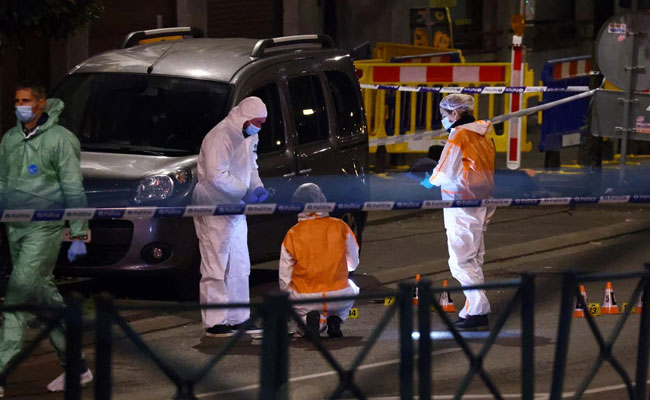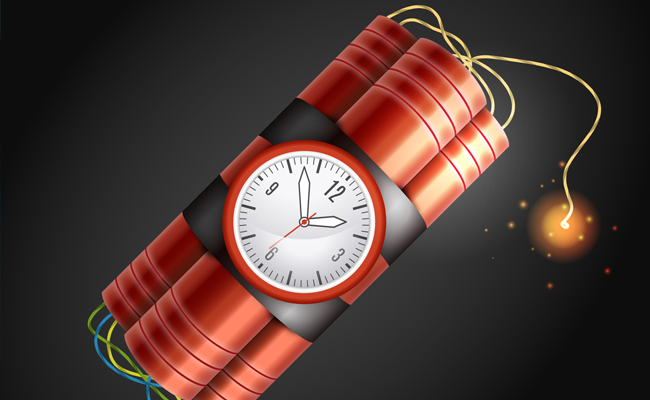Brussels (AP): Thousands of soccer fans were kept inside Belgium's national stadium for about 2 1/2 hours Monday after a game between Belgium and Sweden was suspended at halftime following a gunman fatally shooting two Swedes in Brussels before kickoff.
The European Championship qualifier was being played some 3 miles (5 kilometers) from the shooting in the center of the Belgian capital, and more than 35,000 fans attended the match. With the suspect still at large and going after Swedes, Belgian authorities kept fans inside the venue for security reasons before they started the evacuation around midnight local time.
Fans chanted "All together, All together" inside the King Baudouin Stadium after the match was halted, with thousands of supporters from both sides also shouting "Sweden, Sweden!"
Manu Leroy, the CEO of the Belgian soccer union, said he discovered 10 minutes before kickoff that "something serious" had happened in downtown Brussels.
"It was decided in the first place that the match should go ahead because the stadium was the safest place to be at the time, so that the fans could stay here and be safe," he said.
Eric Van Duyse, spokesman for the federal prosecutor's office, told reporters the investigation was centering on "a possible terrorist motivation for the shooting."
"During the evening, a claim of responsibility was posted on social media, having been recorded by a person claiming to be the assailant. This person claims to be inspired by Islamic State," Van Duyse said. "The Swedish nationality of the victims was put forward as the probable motive for the act. At this time, no element indicates a possible link with the Israeli-Palestinian situation."
Van Duyse added that "security measures were urgently taken to protect the Swedish supporters."
Fans remained patient well into the night and were still chanting as midnight approached.
Leroy said the Swedish fans were last to leave the stadium "because the police will escort the Swedish fans and players, who will obviously go straight to the airport and leave."
"The police will create a security corridor for the Swedish fans so that they can return home safely," he said.
The sight of fans locked inside a major European stadium was reminiscent of the scenes at the Stade de France outside Paris when France's national stadium came under assault from Islamic State extremists during a match between France and Germany on Nov. 13, 2015.
UEFA, European soccer's governing body, confirmed the Belgium vs. Sweden match had been called off.
"Following a suspected terrorist attack in Brussels this evening, it has been decided after consultation with the two teams and the local police authorities, that the UEFA EURO 2024 qualifying match between Belgium and Sweden is abandoned," UEFA said.
Belgium had already qualified for the championships to be held in Germany next year. The teams were tied 1-1 at halftime after Romelu Lukaku canceled out Viktor Gyokeres' opener.
According to Swedish media, some Sweden fans left the stands and were allowed in the media room in the stadium. One fan, Peter Lindqvist, who was at the stadium, told the Expressen newspaper that fans were urged to speak English and take a taxi once they were allowed to leave the stadium.
Players and officials supported the decision to call off the match.
"I found out during the break on the way down and the decision from all the players and managers, both us and Belgium, is obvious, that we cannot play the match. It is completely disgusting," Sweden coach Janne Andersson said. "I get so sad. It is extremely tragic and I think of those affected and their relatives. What kind of world are we living in?"
Belgium's crisis center raised the level of threat in Brussels to the highest possible and asked citizens to avoid unnecessary travel.
The Swedish FA earlier said in a message to Swedish supporters on site that the Belgian police wanted fans to stay in the arena for security reasons.
"Keep calm and take care of each other," the FA said. "Our thoughts go out to all the relatives of those affected in Brussels."
Sweden raised its terror alert to the second-highest level in August after a series of public Quran-burnings by an Iraqi refugee living in Sweden resulted in threats from Islamic militant groups.
Belgian Prime Minister Alexander De Croo suggested the attack, which took place more than an hour before the match, was linked to "terrorism."
"A horrible shooting in Brussels, and the perpetrator is actively being tracked down," said Interior Minister Annelies Verlinden, adding that she was joining government talks at the National Crisis Center.
Let the Truth be known. If you read VB and like VB, please be a VB Supporter and Help us deliver the Truth to one and all.
Shivamogga: A 17-year-old student from Kamakshi Street in the city, Prem Kumar, died of drowning while swimming in River Tunga in Pillangiri village of the taluk recently.
Prem, who was studying in II PUC at DVS College, was visiting the temple in Pillangiri with his friends and got into the river for a swim, when he drowned in the waters of the river.
The youngster’s body has been sent to the mortuary of the McGann Hospital in Shivamogga to conduct a post-mortem examination.
Shivamogga Rural Police visited the spot and held an inspection.





_vb_04.jpeg)